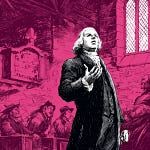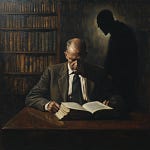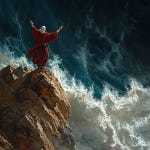Question 43. To what end does the Holy Spirit continue to reveal God’s glory and works in the natural, created order?
Answer: God the Holy Spirit continues to reveal God’s glory and works in the natural created order so that all mankind will see his glory, and prove to be without excuse on the day of judgment; so that believers may worship, glorify, enjoy, love, know, and serve God; and so that in all God may be glorified in all his works.
In some ways, spiritual reality may sometimes feel like a nothingness to us. As children of the materialistic age in which we currently live, this sense of spiritual nothingness may seem particularly acute. The world around us constantly tells us that the “stuff” of this world, matter, our bodies, the trees, money, cars, and so on – the “stuff” is all that there is. We have been fed a steady diet of lies along the lines that reality has no spiritual dimension. The modern man, in western society at least, certainly lives as though this is the case. But this is not especially unique to us, the mantra of fallen man has ever been: ““Let us eat and drink, for tomorrow we die” (1 Cor 15:32). We have, since the fall of our race, had a constant bent towards worshipping and serving “the creature rather than the Creator” (Rom 1:25). Sin has a way of warping or blinding us to spiritual realities. In a world that sees life as a purely biological phenomenon, our blindness is probably even more acute.
And yet the truth is that all things visible were made out of things invisible. In Hebrews 11:3 we read: “By faith we understand that the universe was created by the word of God, so that what is seen was not made out of things that are visible.” Faith is a spiritual faculty, by which we see spiritual reality. We may think that the material is the more weighty, because we associate it with mass, and form, and our sense of touch. In reality, just the opposite proves to be the case. It is the invisible spiritual realm that is the more weighty, and from which even the material realm proceeds.
C.S.Lewis, in the first volume of his “Ransom Trilogy”, does a marvellous job of beginning to re-orient our materialistic bent. “Out of the Silent Planet” is the story of a man named “Ransom”, who is kidnapped by an evil scientist and taken to a nearby planet in our own solar system: “Malacandra” (Mars). As Ransom increasingly becomes more aware of the spiritual dimension of reality, his perspective on the creation as a whole begins to change. On his initial journey to Malacandra, we have a wonderful example of this kind of shift in Ransom’s view as he sees the heavens from a new perspective:
“Ransom, as time wore on, became aware of another and more spiritual cause for his progressive lightening and exultation of heart. A nightmare, long engendered in the modern mind by the mythology that follows in the wake of science, was falling off him. He had read of ‘Space’: at the back of his thinking for years had lurked the dismal fancy of the black, cold, vacuity, the utter deadness, which was supposed to separate the worlds. He had not known how much it affected him till now – now that the very name ‘Space’ seemed a blasphemous libel for this empyrean ocean of radiance in which they now swam… Space was the wrong name. Older thinkers had been wiser when they named it simply the heavens – the heavens which declared the glory – the happy climes that ly, Where day never shuts his eye, Up in the broad fields of the sky” (Lewis, Silent Planet, p.28-9).
“Out of the Silent Planet” is not just a whimsical flight of fancy. It is a weighty tome masterfully designed to start discipling us into seeing the created order in a new way. The spiritual realm is, indeed, the more weighty in comparison to things physical. We may go further: the spiritual realm imbues the physical, and the physical realm mirrors and images (or ought to) the spiritual. It is our world that is the reflection, heaven that is the original and more glorious. Thy will be done on earth as it is in heaven. We began to see this in our last study, that the Holy Spirit actively provides for us and sustains even our very breath. Scripture makes it clear, however, that the Holy Spirit’s revelatory work encompasses the whole of creation.
In the second verse of the first chapter we see that the Spirit hovered over the face of the waters. We hear Job testify that: “By his wind the heavens were made fair” (Job 26:13). Psalm 104 exults in this magisterial presence of the Holy Spirit sustains and renews creation: “When you send forth your Spirit, they are created, and you renew the face of the ground” (Ps 104:30). As Bavinck points out, all three person of the Trinity were active in creation, and “the Holy Spirit is the personal immanent cause by which all things live and move and have their being, receive their own form and configuration, and are led to their destination” (Bavinck, RD2, p.423). “By the word of the LORD the heavens were made, and by the breath of his mouth all their hosts” (Ps 33:6).
There’s a lot of mystery in this intimate connection between the spiritual and the physical, isn’t there? We might instinctively ask the question: How can something come from nothing? There are few notions more absurd to the mind of the materialist. Only a madman would suppose that he can somehow magically make gold materialise in his hand. Cause and effect is a materialistic principle that has become almost absolutised in the minds of many (we won’t address, of course, the intellectual schizophrenia that drives modern atheism to argue that all things come from nothing!). Yet it is true: the things visible were created by things invisible. How can that be? How can something invisible cause that massive, weighty eucalyptus tree outside my window to exist? I don’t have mental categories to understand what this all means, but this we know “what is seen was not made out of things that are visible” (Heb 11:3).
God’s “invisible attributes, namely, his eternal power and divine nature, have been clearly perceived, ever since the creation of the world, in the things that have been made” (Rom 1:20). So then, all the living are “without excuse.” And for those renewed by faith, we can see that “everything created by God is good, and nothing is to be rejected if it is received with thanksgiving” (1 Tim 4:4). For his good pleasure he has made and sustains the creation (Rev 4:11), and in all his glory will be exalted.
We must begin to learn to instinctively see God’s glory in the creation. We must break the shackles of the modern mind, which sees only atoms and molecules because it has been blinded by lies. We must rather learn to see the light, and remember the greater light of heaven. We must learn to hear a breath, and praise God for the imminent presence of his Spirit. We must learn to see ants, and take warning against slothfulness. We must learn to see clouds and let hope ignite at the prospect that one day Christ will come in the clouds with glory. At every point his glory is on display, are your eyes open yet? SDG.













Share this post